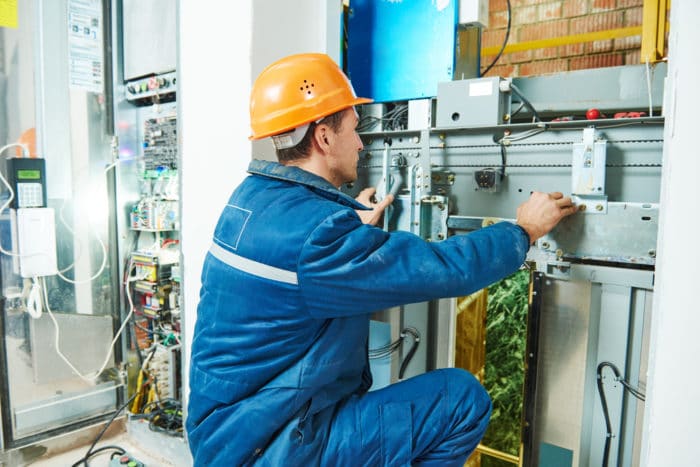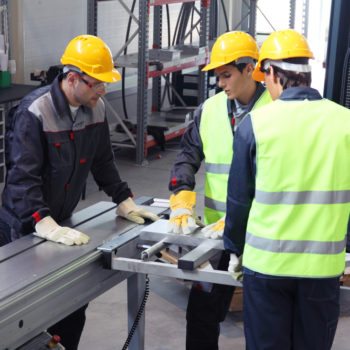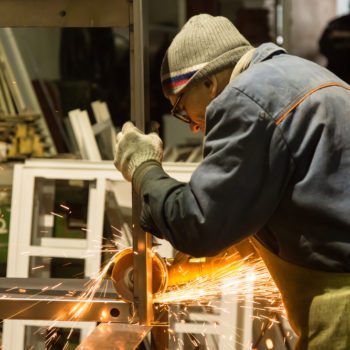Why We Love It
-
$77,350Potential Avg. Salary
-
13%Job Growth Rate
-
Growing DemandJob Outlook
-
Don't Take Work HomeCareer Attribute
Elevator mechanics are referred to with different names such as elevator constructors, elevator repair works, and according to the US Bureau of Labour Statistics, elevator installers and repairers. Their chief responsibility is to specialise in the installation, assembly, maintenance and repair of a wide variety of mechanical equipment for moving people and materials in buildings (i.e. elevators, escalators or walkways).
Recommended Schools
What is an Elevator Mechanic?
Duties
As an elevator mechanic, you are responsible for a range of duties, including the following:
- Performing tests and adjustments of general operating and safety functions of any type of elevator, dumbwaiters, and escalators such as speed, levelling, braking, emergency stop, and alarm bell.
- Maintaining or repairing electronic control panels, switches, relays, signal devices, electric motors, generators, etc. as required.
- Inspecting, adjusting, maintaining and repairing hoist motors and machinery, governors, door mechanisms, cables, hydraulic buffers, pumps, brakes, rails, guides and related equipment.
- Determine the need for technical work such as a major overhaul or replacement of defective elevator equipment, in accordance with building codes.
- Review and maintain work records, tools and equipment.
Day in the life
Elevator mechanics have a busy schedule and often end up covered in dirt, concrete or sheetrock dust, working in both residential and commercial buildings depending on the job. If your work involves installing new elevators, then you will also have the opportunity to work on a construction site.
When setting up new elevators, you would measure the pit floor, set the pit-plate and stack rails on the hoistway. Running the electrical wiring, hanging the doors, building the elevator car and adjusting it, are also part of your job. Building new elevators can take up to 3 weeks.
Other service work can include repairing and performing annual tests on elevators that are already installed on a range of project sites. It is important to work efficiently, while keeping in mind the safety of the public already occupying these buildings.
Work schedule and typical hours
An elevator mechanic’s work varies depending on the tasks assigned. For instance, if working on installing new elevators, you might have to work Monday through Thursday, from 7 am to 6 pm. Otherwise, handling service issues require a five-day work schedule.
Growth of the job
As per the U.S. Bureau of Labour Statistics, the job outlook will be positive for those in the elevator mechanic industry, with employment growing faster than the average for all occupations through 2024. In particular, an 11 percent increase is expected in the number of jobs for the occupation between 2010 and 2020.
Candidates that have a post-secondary education in electronics or previous military experience will be given preference for formal apprenticeships. Those who want to work as elevator mechanics, expect a good number of job opportunities, but competition will also be tough.
Typical employers
The pay scale can differ from program to program, but apprentices usually start earning at 35 – 50 percent of a journeyman rate. Employers of full-time elevator mechanics are usually private companies such as All-Ways Elevators and Otis Elevators. Educational institutions such as universities, state and city departments and large residential or commercial complexes also look for elevator mechanics to hire.
Most employers offer great health, vacation, annuity, and pension benefits. Some states also require elevator mechanics to complete licensing exams for public safety standards. These exams test an elevator technician’s knowledge of installation procedures.
Recommended Schools
How To Become an Elevator Mechanic
The first step towards becoming an elevator technician is by finishing a five-year apprenticeship program, during which the candidate should complete 144 hours of classroom instruction. During such a program, one is usually acquainted with both classroom lessons as well as applied training on the job. For instance, the National Elevator Industry Educational Program (US) and individual associations such as the Association of Elevator Contractors of the metropolitan area of New York, offer apprenticeships to aspiring mechanics.
Typically, a high school diploma or equivalent suffices as the basic qualification required, although military veterans are given preference. Such apprenticeships can be secured via a local union or business, as well as educational institutions. The first year of apprenticeship includes probationary employment, where you have to do 6 months of online schooling. Coursework includes laboratory and theory experience, covering various topics such as technical safety classes, types of hoistway structures, mechanical and electrical theory and application.
Since elevator technicians need superior physical strength and stamina, aspiring candidates will do well to focus on a structured fitness plan. This will enable them to lift heavy tools or equipment easily. On the job injuries are also a common risk, such as a fall or muscle pull.
Elevator Mechanic Salary Data
We’ve provided you the following to learn more about this career. The salary and growth data on this page comes from recently published Bureau of Labor Statistics data while the recommendations and editorial content are based on our research.
National Anual Salary
Low Range
$59,750Average
$77,350High Range
$111,370National Hourly Wage
Low Range
$29/hrAverage
$37/hrHigh Range
$54/hrHow do Elevator Mechanic salaries stack up to other jobs across the country? Based on the latest jobs data nationwide, Elevator Mechanic's can make an average annual salary of $77,350, or $37 per hour. On the lower end, they can make $59,750 or $29 per hour, perhaps when just starting out or based on the state you live in.
Salary Rankings And Facts
#154 Nationally for All Careers
Above Average Salary Nationally
Highest Education Among Elevator Mechanics
- 0% Doctorate
- 0.2% Masters
- 7.5% Bachelors
- 10.5% Associates
- 33% College
- 44.7% High School
- 4.2% Less than High School
Job Growth Projections and Forecast
2014 Total Jobs
20,7002024 Est. Jobs
23,400Job Growth Rate
13%Est. New Jobs
2,700How does Elevator Mechanic job growth stack up to other jobs across the country? By 2024, there will be a change of 2,700 jobs for a total of 23,400 people employed in the career nationwide. This is a 13% change in growth over the next ten years, giving the career a growth rate nationwide of Above Average.
Growth Rankings And Facts
#130 Nationally for All Careers
Above Avg. Growth Nationally
What Companies Employ The Most Elevator Mechanics
| Industry | Current Jobs | New Jobs Needed | % Increase |
|---|---|---|---|
| Other building equipment contractors | 18,400 | 2,600 | 3% |
| Other general purpose machinery manufacturing | 500 | --- | --- |
| Colleges, universities, and professional schools; state | 200 | --- | --- |













